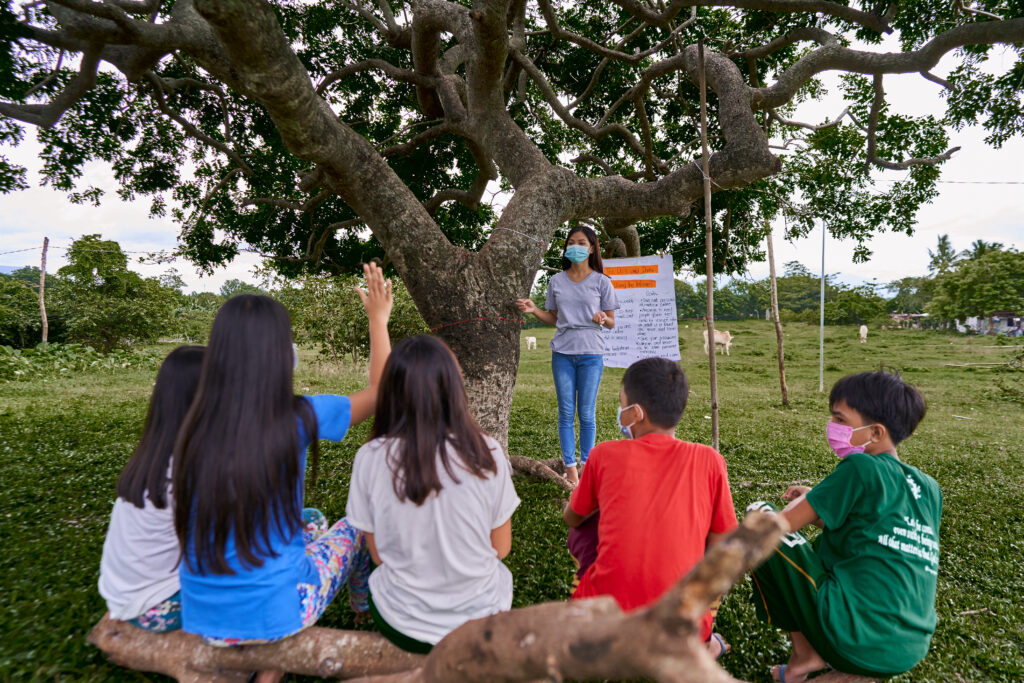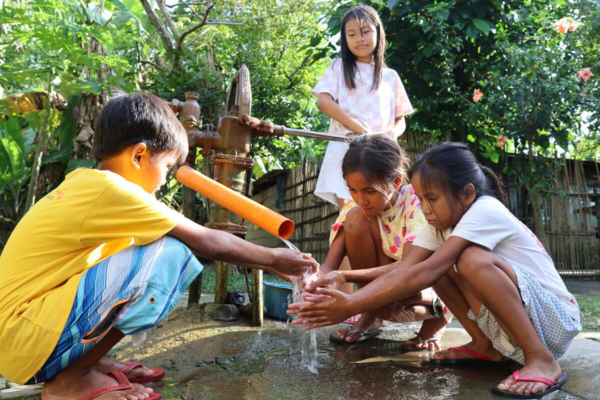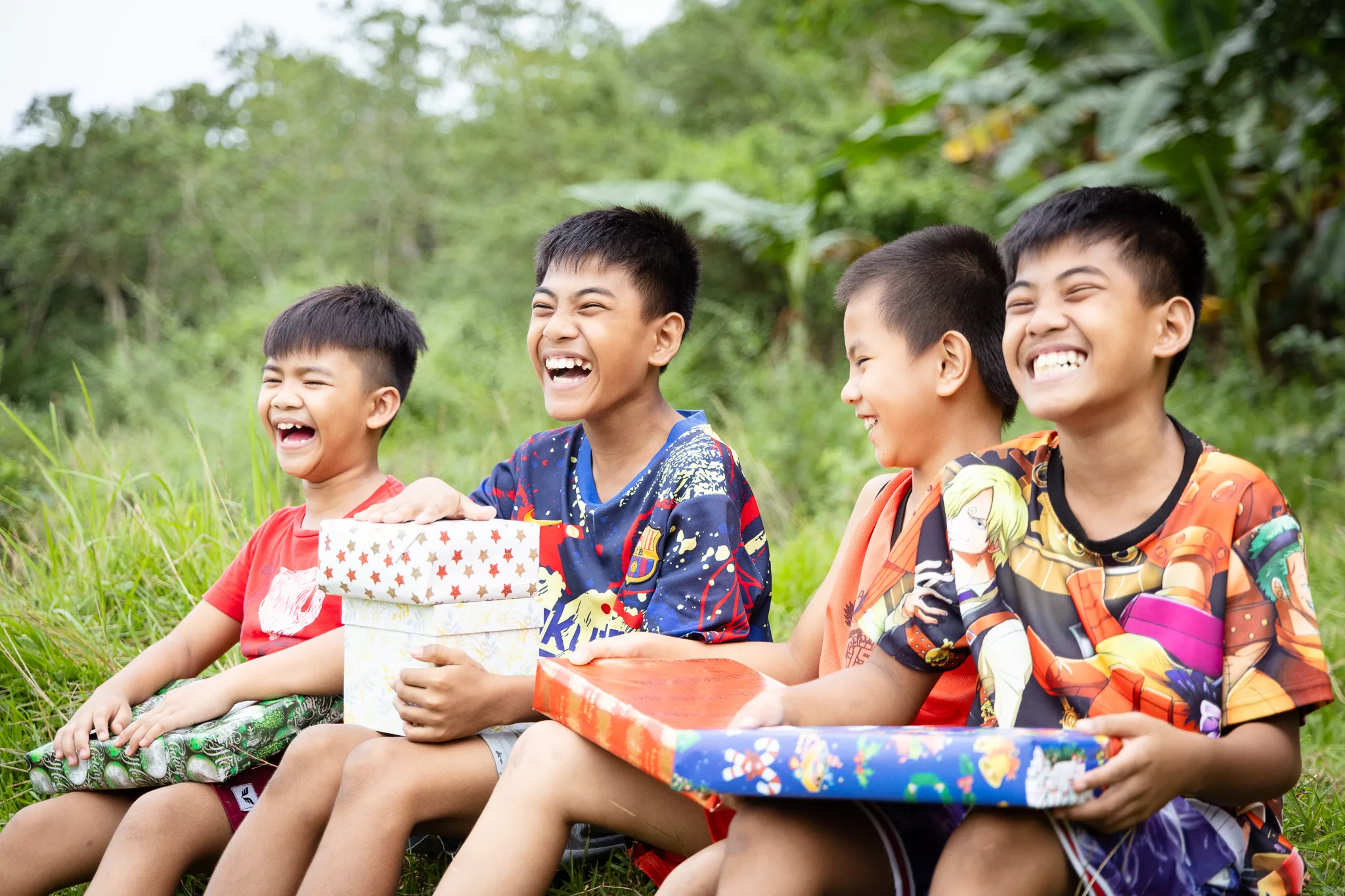Teen raises awareness on online sexual exploitation of children
Michaela, 16, folds the white cartolina. It’s almost noon. She waves goodbye to her friends whom she just had a brief discussion about Online Sexual Exploitation of Children (OSEC).
“When I’m not studying, I share with other youth what I learned from various World Vision youth activities that I attended before the pandemic,” Michaela says, walking towards their home where her siblings were busy preparing for lunch.

OSEC is the production, for the purpose of online publication or transmission, of visual depictions (e.g., photos, videos, live streaming) of the sexual abuse or exploitation of a minor for a third party who is not in the physical presence of the victim, in exchange for compensation.
Sitting in a corner of their living room, Michaela continues, “Today, we’ve discussed about online safety. Children nowadays are growing addicted to the Internet that they forget to talk to their friends and families. It also becomes a new form of danger to children and youth.”
A 2020 study conducted by the International Justice Mission (IJM), which combats violence against children in the Philippines, showed that the prevalence rate of internet-based child sexual exploitation in the Philippines has more than tripled in a span of three years from 43 internet sites used for child sexual exploitation in 2014 to 149 in 2017.
The Philippines has become a global hotspot for OSEC, receiving more than eight times as many referrals as any other country during the 2010-2017 baseline period, the same IJM report entitled Online Sexual Exploitation of Children in the Philippines: Analysis and Recommendations for Governments, Industry and Civil Society stated.
Michaela has been reading and hearing news on children being exploited online and it worries her. “When adults are encouraging children to do bad things online, the children’s perspective of themselves becomes distorted as well. The children grow in fear and unable to express their real feelings and thoughts.”
She says that most of the times, children do not know the extent of the danger the Internet may bring. “Children do not know that their pictures could reach several individuals in various countries. For sure, exploited children have fear but is unable to do something about their situation because they are merely children.”
Overcoming fear
Children may be protected from being exploited if he/she is aware on what should and should not be done online. Children, she says, must be able to develop self-confidence so he/she could say “no” or analyze his/her situation. Being active in school is a good start.
Michaela admits being be a shy girl. “I was so shy and even fear talking to a large crowd.”
Around that time, World Vision was sponsoring her elder sister, Marie Mae, who became one of the organization’s active child leaders. “My Ate became my inspiration and role model. I observed what she used to do with World Vision and in school, and I decided to do the same,” Michaela says.
Michaela slowly overcame her fear when she reached high school. She became an active member of different student organizations and eventually being an officer and facilitator. She also started joining World Vision activities where her leadership skills were further honed. One of her memorable experiences with World Vision is the training on Spiritual Nurture for Children held in Tagaytay because it was the first time she met other child leaders from other provinces, and HIV and AIDS for Youth held in Batangas because it was the first time she facilitated around 30 child and youth participants.

“Joining World Vision activities taught me a lot such as never giving up on what you want to achieve in life, believe in yourself that you can do things, and be a good leader so other children and youth will follow your good examples” Michaela shares.
She also develops not just self-confidence but gained knowledge about children’s rights and responsibilities. “I guess children’s activities is one way to help children avoid deceitful individuals online because children will be more aware on what to do.”
Another way to avoid falling prey to online sexual exploitation, she adds, is having a good and Christ-centered relationship among family members. Michaela grew up in a close-knit family of nine children. Her father used to work as assistant bus driver. After his recent death, her mother became the head of the family, a difficult task for a woman who used to stay home ensuring that her nine children and husband are cared for.
“My parents taught us to be strong. I saw how my mother stood strong after my father died. My father, when he was still alive, taught us to learn to stand on our feet,” Michaela shares, pausing at times to wipe her tears from grief she still feels for the untimely death of her father six months ago.
Without a father now, all nice children are helping their mother have both ends meet. Her Ate Mari Mae is currently doing part time tutorial to younger children in the village. Their elder brothers, who are working, contribute whatever they can to the family’s daily needs and younger siblings school needs. Of the nine children, five are still in school.
‘Don’t give your password’
With large and extended families, Michaela communicates with them via online. “This is one of the good things the Internet brings, we can talk to our loved ones from afar. Also, a lot of children can easily research online on topics related to their school assignments, especially now that there are no physical classes.”
Some children and youth, however, tend to do more on the Net. “Children and youth nowadays are becoming addicted to Internet. They think that everything online is ok. This is not good. Sexual exploitation can also start from being naïve,” she says.
She shares a few reminders to children and youth. “There are two reminders that I usually share with my friends: One, never, ever give your password. And, two, never share your personal information online. I know some youth who share their Facebook passwords and information to their boyfriends or girlfriends, which is not a good thing because who knows what will happen.”
Michaela’s passion to share information made her decide to take an Education course and be a teacher someday. “I’m enjoying teaching children at the moment. It makes me happy to see that they are learning from what I am sharing.”








